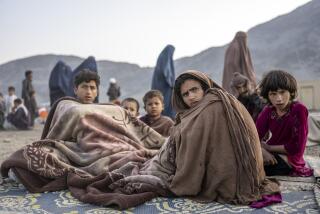Pakistan’s Tightrope
- Share via
The Pakistani president’s defense Wednesday of his offer to assist the United States in finding terrorist Osama bin Laden was a skillful tightrope walk. He navigated between U.S. demands on one hand and Islamic hard-liners at home on the other. If the U.S. winds up using Pakistan as a staging area for air and ground attacks on neighboring Afghanistan, home to Bin Laden and site of his training camps, it will owe a debt to an impoverished nation. Repaying that debt will require deft maneuvering.
Gen. Pervez Musharraf insisted in his televised address to his countrymen that the target was Bin Laden and terrorism, not Islam or Afghanistan. That’s an important point to be made in all countries with Islamic fundamentalist movements and one that Washington rightly has begun stressing as well.
President Bush on Wednesday welcomed to the White House Indonesia’s Megawati Sukarnoputri, president of the world’s most populous Muslim nation. He said that “the war against terrorism is not a war against Muslims nor is it a war against Arabs.”
Musharraf did not criticize the Taliban government of Afghanistan, which has welcomed Bin Laden as a “guest” for years. That is not surprising. Pakistan has been a main backer of the Taliban and is home to millions who support that regime and demand a more fundamentalist form of Islam in Pakistan. Even before Musharraf spoke, protesters in the southern city of Karachi burned effigies of him and Bush.
Throughout the Cold War, Pakistan was a staunch ally of the United States. After the Soviets invaded Afghanistan in December 1979, Washington funneled large amounts of money and weapons through Pakistan to the Afghan rebels, the moujahedeen who eventually paved the way for the Taliban government.
Unfortunately, after the collapse of the Soviet Union, the United States lost interest in Afghanistan, which was ravaged by years of civil war. It is a mark of how devastating the carnage was that when the Taliban came to power, with their medieval decrees against women and their assault on other religions, they were welcomed for imposing order.
As for Pakistan, it was subjected to U.S. sanctions in 1990 for trying to develop nuclear weapons. More sanctions followed in later years, with the most recent coming after Musharraf seized power in a coup two years ago. Although military takeovers have been all too common in Pakistani history, this one was remarkable for being the first time the military forces of an announced nuclear power seized control from an elected civilian government. The great danger in Pakistan is of an anti-Western Taliban-style government armed with nuclear weapons.
The sanctions unfortunately have barred the training of the Pakistani military in U.S. installations. That should be reversed. It will benefit both countries to have closer ties between the United States and the men who will likely rule Pakistan for some time.
The United States also should provide more money to care for the enormous number of Afghan refugees in Pakistan, a task for which the United Nations is well suited. U.S. aid should also bolster public education in Pakistan. This year, state education funds amount to a paltry $2.3 million. Most Pakistani boys, if they are educated at all, attend schools run by Islamic fundamentalists who teach a mix of religion and hatred for the West.
Islamabad is likely to request U.S. weapons as well, an issue that deserves the closest scrutiny. The United States must ensure it does not further alarm India, a democracy too long neglected by Washington. An unfortunate part of Musharraf’s speech was his bitter words for India, a nation with which Pakistan has fought four wars and which, like Pakistan, has nuclear weapons.
Musharraf’s speech, though carefully hedged, got a swift welcome at the White House. U.S. officials correctly recognized the general’s courage in defending his decision to aid the United States at all.
More to Read
Sign up for Essential California
The most important California stories and recommendations in your inbox every morning.
You may occasionally receive promotional content from the Los Angeles Times.










